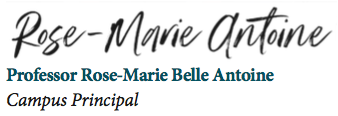While we continue to commemorate the creation of The University of the West Indies’ 75 years ago, 2023 is also the year to celebrate another important milestone for the university – the establishment of the UWI Seismic Research Centre (SRC). Originally named the Seismic Research Unit, the SRC was born from a Colonial Development and Welfare (CDW) project and began operations in 1953. In the 70 years since, it has grown to become a vital Caribbean resource for information on the status of earthquakes and volcanic activity in the English-speaking Eastern Caribbean.

In 2020-2021, the SRC played a crucial role in the response to the eruption of La Soufrière volcano in St Vincent. It continually provides the region with regular updates on the seismic activity that has been taking place since early July of this year.
Earthquakes and volcanoes are powerful, primal forces that we have no power to control. Our greatest assets in the face of such disasters are data and emergency protocols that maximise our ability to mitigate the dangers. The UWI SRC has a seven decade legacy of providing this service to millions of people in our region. I was very pleased that we were able to host a special SRC anniversary event on June 21 during which Dr Keith Rowley, the first “local” head of the department, was honoured (see article in this issue). That wonderful occasion reminded me of the several other key UWI centres and units providing vital service and support to the country, region, and beyond.
The SRC is just one of several specialised centres at UWI St Augustine. There are more than 20 university centres, units, and institutes. Some of them are well-known through the media or the pages of UWI TODAY. Others may not spend much time in the spotlight, but their work is equally necessary and potentially transformational. All of them are great assets to The UWI and, by extension, Caribbean society.
These specialised entities serve many functions. They might be designed for very specific educational services and training. They might be research hubs for very specific fields. They provide knowledge and expertise to policymakers and organisational leaders. They support civil society organisations, and in some cases, lead national and regional advocacy and justice efforts. In some cases, they are service providers in a number of sectors. Many of our specialised units perform several of these roles. Some perform all of them.
Through the National Herbarium, we are able to protect, preserve, and provide extensive information on the flora of Trinidad and Tobago. The Mechanical and Manufacturing Enterprise Research Centre provides a hub for industry-academia partnerships. The UWI Archaeology Centre conducts archaeological research, mapping, surveying and excavation for the preservation of our heritage. We train leaders in business and entrepreneurship at the Arthur Lok Jack Global School of Business, one of the most well-recognised and highly regarded institutions in the region. We conduct extensive research and provide policy support for the strengthening of regional health policy at the Caribbean Centre for Health Systems Research and Development. Our centres, units, and institutes do these things and much more.
This is an opportune time to speak about our specialised units because they tend to work in a very direct and tangible manner to meet the needs of society. Many were created to meet a very specific need. As such, they show just how positive an impact The UWI has in Trinidad and Tobago, and the region. In an environment of slowed economic growth and the need for every institution - academic or not – to demonstrate the value they bring, we can point to our UWI centres, institutes, and units with great confidence.
See how our Cocoa Research Centre has revolutionised our cocoa sector and almost singlehandedly created and nurtured a vibrant chocolate industry. Observe the example of our Centre for Language Learning, which is not only well-regarded for its teaching, but is also an informal centre for diplomacy and cultural exchange. As a nation still plagued by gendered violence and discrimination, this society relies on the advocacy and thought leadership of our Institute of Gender and Development Studies. Our St Augustine Centre for Innovation and Entrepreneurship works toward catalysing an entrepreneurship and innovation revolution in Trinidad and Tobago, with The UWI leading by example.
Perhaps, the best known of The UWI’s specialised units is the one I began with, The UWI SRC. They were there, on the ground, in St Vincent when the volcano erupted. Its forecasts helped the government make crucial decisions about evacuating people from affected areas. Some 20,000 people were evacuated from harm’s way. We turn to it whenever we feel a tremor.
Speaking shortly after the event, SRC director Dr Erouscilla Joseph said, “We approach this as scientists, but it’s a risky job and we continue to do it because we’re conscious that people’s lives and livelihoods could be affected.”
What better way to encapsulate the valuable work of The SRC and the work of The UWI itself?
For more information on UWI St Augustine's specialised centres, units, and institutes, visit https://sta.uwi.edu/academic-departments/.
